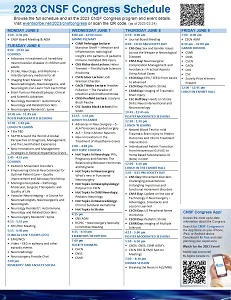Industry Supported Session
Lunch ’n Learn: The use of novel biomarkers for mild Traumatic Brain Injury to predict outcomes and inform treatment interventions
Audience:
Adult Neurologist, Neurosurgeon, Neurophysiologist, Resident, Fellow, Nurses with interest in topicLearning Level:
Intermediate (Practicing Physician), Advanced (Special Interest, Higher Level Discussion)Learning Format:
Audience response system, Case studies, Discussion group/peer exchange/user groups, Forum/panels, Lecture/plenary method, Question and answer sessions, Seminar, Small group discussionCanMEDs Roles:
Medical Expert, Scholar, Communicator, Collaborator, Leader, Health Advocate, Professional-
BM
-
JB
-
MN
Faculty(s)
Emergency Department (ED) overcrowding is a pervasive problem in Canada, which has been exacerbated even further by the pandemic. This overcrowding reduces the capacity in the ED potentially leading to well-known consequences such as, patients leaving prior to the completion of care due to frustration, adverse patient outcomes, increased risk of hospital-acquired infections, and errors in patient management. As wait times in the ED increase so do wait times for medically necessary diagnostic imaging, often coming with a high price tag. The current assessment of traumatic brain injury (TBI) has thus far relied on computed tomography (CT) scans to be performed and interpreted by experts, a resource not always available in urban and more rural regions. The use of novel biomarkers has recently been shown to assist in determining the need for a CT scan of the head in suspected cases of mild TBI within 12 hours of injury, thus easing the burden on an already strained healthcare system and possibly helping to mitigate some of these issues.
This program was developed by the CNSF and Abbott and was planned to achieve scientific integrity, objectivity and balance. It is an unaccredited learning activity and not eligible for MOC credits.
Learning Objectives:
- Understand the prevalence and impact of mild Traumatic Brain Injury in Canada
- Understand the limitations of the current clinical evaluation pathway of mild traumatic brain injuries
- Recognize the potential benefits of brain blood biomarkers implementation in Emergency Departments
- Familiarize with published clinical data of brain injury biomarkers currently under investigation
Presentations:
-
12:00 PM – 12:05 PM MSTWelcome & Introduction
-
12:05 PM – 12:25 PM MSTOverview of Abbott’s Neurology Biomarkers
Speaker: Beth McQuiston
-
12:25 PM – 12:55 PM MSTAlert trial and rule out use for head CT
Faculty: Jeffrey Bazarian
-
12:55 PM – 1:00 PM MSTCase Study Review – experience from global early adopters
Faculty: Matthew Noble
-
1:00 PM – 1:25 PM MSTPanel Discussion and Q&A with audience • What would it take to implement TBI biomarkers in your health system?
-
1:25 PM – 1:30 PM MSTWrap Up and Course Evaluation

.png)
